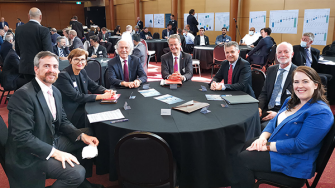
This is the text of Professor Attila Brungs' welcome to the delegation of government officials and renewable energy industry experts from Germany, led by Minister for Education and Research, Bettina Stark-Watzinger. The delegation visited UNSW Sydney on Thursday 26 May 2022 to progress the UNSW-led 'HySupply' study that is investigating the viability of renewable hydrogen trade between Australia and Germany.
I also start by acknowledging the Bidjigal People, the traditional owners of the land on which we meet.
And I pay respect to the Elders both past and present, acknowledging them as the custodians of knowledge for this land.
We are honoured to have with us today:
- Germany’s Federal Minister of Education and Research, Bettina Stark-Watzinger
- Dr Stefan Kaufmann, Dr Volker Rieke and members of the German delegation
- German Ambassador to Australia, His Excellency Thomas Fitschen
- Australian Ambassador to Germany, His Excellency Philip Green
- Consul-General of Germany, Mr Axel Zeidler
- Member for Kingsford Smith, Matt Thistlethwaite – and congratulations on your government’s success on Saturday, Matt
- Parliamentary Secretary to the NSW Treasurer, Felicity Wilson
- Dr Alan Finkel, Special Advisor of Low Carbon Technology, Australian Department of Industry Science Energy and Resources
- Representatives of the Australian and NSW Governments, industry and research institutions.
I offer you all a warm welcome to UNSW.
I think the number of distinguished guests we have here today is an indication of how much UNSW and Germany value our relationship.
And it extends beyond the research we are here to discuss today.
UNSW has 22 student exchange partnerships in Germany.
With borders now open, we will welcome our first inbound exchange students later this year and 23 are from Germany, while 18 UNSW students will travel the other way to study in Germany.
Australia has always been an advocate of international education for its myriad benefits, not the least of which is the great ties it builds between people and cultures.
And we see those same benefits in international research partnership.
Germany is one of our key collaborators with some 24 contract research projects from Germany, and many UNSW-led grants that include a German collaborator.
Our research partnerships span areas as diverse as quantum computing, climate and this important project – led by UNSW’s Professor Iain MacGill – on hydrogen produced from renewable energy.
HySupply sees collaborators from Germany and UNSW investigating the feasibility of a supply chain spanning the production, storage, transport and use of hydrogen produced from renewable energy.
Scientists from our two countries have long seen the urgency of the climate crisis and renewable energy is increasingly seen as the solution.
As our German friends will have seen as you visited other stakeholders in Australia, a country so at risk from the extremes of climate change has a particular incentive to help society take climate action.
We see this too often in the extremes of drought, bushfires and floods.
UNSW has a long and proud history in climate science and is a leader in clean energy research and education.
We work closely with state and federal governments and industry on a range of clean energy, decarbonisation and recycling initiatives.
We host the Australian Research Council’s Training Centre for the Global Hydrogen Economy – bringing together leading researchers and industry partners to accelerate hydrogen transition into industry.
The PERC technology found in the majority of solar cells used around the world was developed right here at UNSW 40 years ago.
And we have also been working on green hydrogen for decades, long before the international community fully appreciated its key role in a low-carbon and secure global energy future.
We see its potential but also appreciate the challenges still before us.
This race to renewables will only accelerate and UNSW is delighted that our German friends are adding their academic excellence, industry knowledge and government policy foresight to the discussion and action.
I warmly welcome you all to UNSW.
This is an exciting time for research and for renewable energy. Its role and purpose in clawing back emissions is indisputable.
And with that in mind, I wish you well in your discussions today and to the success of the HySupply project.
